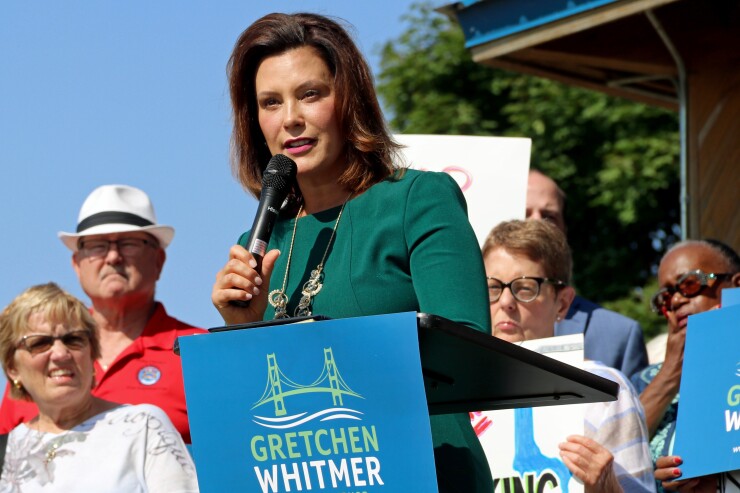Michigan Gov. Gretchen Whitmer said she plans to forge ahead with a $3.5 billion bond-funded plan to pay for state road work despite a legislative effort to derail the borrowing.
Senate Republicans, who hold a majority, on Wednesday approved a bill that would require the State Transportation Commission to notify lawmakers of its intent to issue over $100 million in transportation bonds at least 30 days before authorizing the bonds. The bill, sponsored by Sen. Roger Victory, R-Hudsonville, would give the legislature the ability to reject those bonds within 30 days.

The Senate also adopted a concurrent resolution Wednesday outlining its intent not to approve spending for debt service on bonds outstanding longer than a decade or which increase spending above current levels. The legislation was approved 22-16 along party lines.
Both the resolution and the Senate bill now head to the House of Representatives for further review. The House is controlled by Republicans.
The legislation marks the latest salvo in a dispute between the first-term Democratic governor and the Republican-controlled legislature over how to pay for roads. Lawmakers previously rejected Whitmer's plan to raise the gasoline tax by 45 cents per gallon to generate new revenue. Whitmer floated the bond plan as an alternative to what she believed would have addressed the long-term funding needs of Michigan roads.
“The commission can currently issue bonds with no legislative input — regardless of how much debt they pass on to future generations,” Victory said in statement. “This measure is about giving the legislature — which represents the Michigan people — a voice in large transportation bonding decisions.”
Tiffany Brown, a spokesperson for Whitmer said that the push by Republican lawmakers would not stop her plan.
"Governor Whitmer is eager to negotiate with anyone who puts a serious plan on the table,” Brown said. “This isn’t serious. Pretending there’s revenue where there’s not is exactly how we ended up with the worst roads in the nation. The legislature needs to step up and present a responsible, serious plan to fix local roads. In the meantime, the governor will continue moving forward with her Rebuilding Michigan plan to start fixing our most highly traveled state roads and freeways this construction season. She’s doing what she can to move dirt on our roads right now. It’s time for the legislature to do the same.”
Brown did not respond to questions about whether Whitmer plans to veto the Senate bill if it is passed by the House.
James Hohman, director of fiscal policy at the Mackinac Center, said since the concurrent resolution is not a bill its likely Whitmer doesn’t have the option to veto it. “I do not think it would affect the $3.5 billion in bonding since the bonding has already been approved by the state transportation commission,” Hohman said. "And in addition, the resolution does not change what has been authorized by statute.”
The bond-financed road plan carries a $1.6 billion price tag for interest payments over the 25-year life of the bonds.
MDOT plans to issue state trunkline fund bonds, which are secured by MDOT's portion of fuel taxes and vehicle registration fees that are distributed to the state, counties, cities and villages. The bonds would be sold over the next four years and do not require legislative approval.
The plan will allow MDOT to nearly double capital spending over the next five years to $7.3 billion from $3.9 million, adding 122 projects that the agency otherwise would not have the money to do in that period.
It would also raise MDOT's annual bond debt service to $301 million from $118 million, according to MDOT's finance department.
The state has about $463 million of outstanding state trunkline fund bonds. They are rated Aa2 by Moody’s Investors Service and AA-plus by S&P Global Ratings.
In a statement, Sen. Jim Stamas, R-Midland, said bonding should be used as a financing tool, not a long-term road funding plan, and said the governor needs to work with the legislature on a responsible roads plan that improves both local and state roads.
“The Michigan Constitution clearly intends for the legislature — the voice of the people — to be involved in transportation bonding decisions,” said Stamas. “Michigan families need an affordable solution that fixes the roads and doesn’t saddle them with decades of debt.
“We need the governor to come to the table and work with the legislature on a responsible plan that improves all the roads in our state. In the meantime, we need to stand up for Michigan taxpayers against the unchecked addition of more state debt,” he said.
Michigan House Republicans on Wednesday proposed a new transportation-funding plan that would direct an additional revenues toward local roads without raising fuel taxes. The proposal relies on eliminating the 6% sales tax on fuel over three years and replacing it with an equivalent per-gallon gasoline tax hike.
The legislation would result in approximately $800 million annually in additional funding for the other 92% of roads not covered under Whitmer’s bond-financed plan, with the revenue breakdown being 60% for county roads and 40% for city and village roads.
“Maxing out the state credit card to accrue massive amounts of debt that will take decades to pay off is not a solution to the problem,” Rep. Matt Hall, R-Marshall, said in a statement. “What we are doing is targeting the crux of Michigan’s road dilemma, and that is making sure the revenue generated by gas taxes we already have implemented are going toward what they were actually supposed to go.”
The school aid fund, which receives much of the sales tax collected at the pump, would remain funded by diverting income tax revenue from the general fund.





